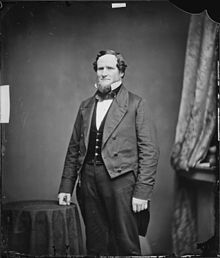William Barksdale
| William Barksdale | |
|---|---|
 |
|
| Member of the U.S. House of Representatives from Mississippi's 3rd district |
|
|
In office March 4, 1855 – January 21, 1861 |
|
| Preceded by | Otho R. Singleton |
| Succeeded by | Henry Barry |
| Member of the U.S. House of Representatives from Mississippi's at-large district |
|
|
In office March 4, 1853 – March 3, 1855 |
|
| Preceded by | no at-large seats |
| Succeeded by | district eliminated |
| Personal details | |
| Born |
August 21, 1821 Smyrna, Tennessee |
| Died | July 3, 1863 (aged 41) Gettysburg, Pennsylvania |
| Resting place |
Greenwood Cemetery Jackson, Mississippi |
| Political party | Democratic |
| Profession | Newspaper editor, soldier |
| Military service | |
| Allegiance |
|
| Service/branch |
|
| Years of service | 1847–1848 (USA) 1861–1863 (CSA) |
| Rank |
|
| Unit | 2nd Mississippi Infantry (USA) |
| Commands |
13th Mississippi Infantry (CSA) Barksdale's Mississippi Brigade |
| Battles/wars | |
Mexican-American War
American Civil War
William Barksdale (August 21, 1821 – July 3, 1863) was a lawyer, newspaper editor, U.S. Congressman, and a Confederate general in the American Civil War. A staunch secessionist, he was mortally wounded during the Battle of Gettysburg while leading his brigade's attack on Union forces not far from Cemetery Ridge.
William Barksdale was born in Smyrna, Tennessee, the son of William Barksdale and Nancy Hervey Lester Barksdale. He was the older brother of Ethelbert Barksdale, who would serve in both the antebellum U.S. Congress and then the Confederate States Congress during the Civil War.
Barksdale graduated from the University of Nashville and practiced law in Mississippi from the age of 21, but gave up his practice to become the editor of the Columbus [Mississippi] Democrat, a pro-slavery newspaper. He enlisted in the 2nd Mississippi Infantry Regiment and served in the Mexican War as a captain and quartermaster, but often participated in the infantry fighting as well.
After the war, he entered the U.S. House of Representatives and achieved national prominence as a States' rights Democrat, serving from March 4, 1853, to January 12, 1861. He was considered to be one of the most ferocious of all the "Fire-Eaters" in the House. He allegedly stood by the side of Representative Preston S. Brooks as Brooks attacked Massachusetts abolitionist Senator Charles Sumner in the Senate chamber with a cane, although he was not one of the members that the House tried to censure after the incident.
...
Wikipedia
